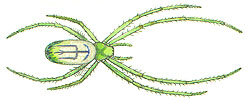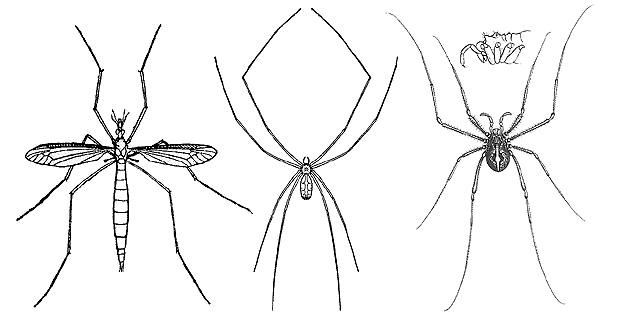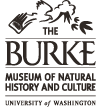 |
|
| You Are Here: Burke Museum : Spider Myths : General : Daddy-Longlegs |
General Fallacies
Myth: A "daddy-longlegs" is a kind of spider.
Fact: This is a tricky one. Unfortunately, different
people call completely different creatures by the "daddy" term.
Most Americans who spend time outdoors use the term for long-legged harvestmen (below, right),
which are ground-dwelling outdoor creatures. Harvestmen are arachnids,
but they are not spiders -- in the same way that butterflies are insects, but
they are not beetles. Harvestmen have one body section (spiders have two), two
eyes on a little bump (most spiders have eight), a segmented abdomen (unsegmented
in spiders), no silk, no venom, a totally different respiratory system, and
many other differences; not all have long legs.
The British, some Canadians, and some southeastern Americans use the "daddy"
term for long-legged flies (crane flies, family Tipulidae) (below, left), which are insects.
That usage is found in Edward Lear's famous nonsense poem "The
Daddy-Longlegs and the Fly."
Finally, people who seldom venture outdoors may only have seen one long-legged
arachnid, the house spider Pholcus phalangioides (below, center), and use the "daddy"
term for that. So there is one "daddy-longlegs" which is a spider,
and a couple of thousand species which are not spiders.
Confusing, isn't it? I think so too; in fact, it's so confusing that the "daddy"
term really doesn't mean anything, and it would be better to just forget it
and say "harvestman" when you mean harvestman. Click
here to jump to a popular urban legend about harvestmen.
 |
|
Will the real "daddy-longlegs" please stand up? That confusing term is used for all these widely different creatures: (left) a crane fly, Tipula sp.; (center) a pholcid house spider, Pholcus phalangioides;(right) a harvestman, Metaphalangium albounilineatum (one of many similar harvestman species). Insects have their myths too: crane flies are not giant mosquitoes -- and they don't eat mosquitoes either! |
| Previous Myth | Myths Home | Web Resources | Next Myth |
 |
Text ©
2003, Burke Museum of Natural History & Culture, University of Washington, Box 353010, Seattle, WA 98195, USA Phone: 206-543-5590 Photos © as credited |
Queries
to Spider Myths author, Rod Crawford This page last updated 1 September, 2010 This site best viewed at 800 x 600 using IE 5.0 or above. |